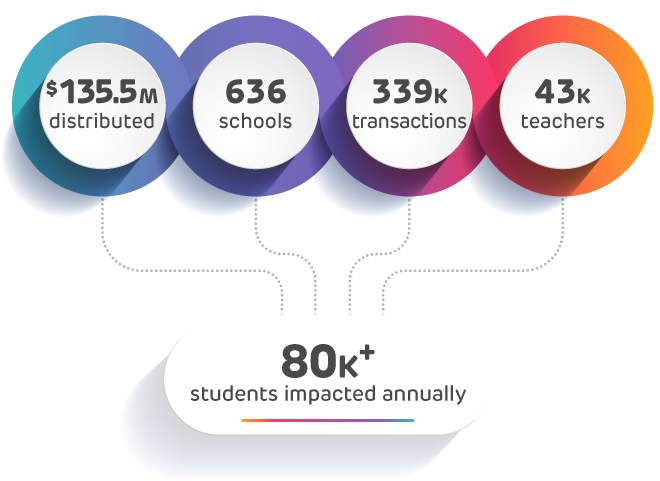
CLIENT HIGHLIGHT
Leveraging Technology for Greater Impact: GA DECAL’s Strides in Early Care and Education
Early care and education (ECE) in the United States is facing a perfect storm: skyrocketing costs, a shortage of qualified providers and a growing understanding of how crucial those early years are for a child's lifelong success. Families are struggling to find affordable, high-quality care, and too often, the system feels broken. But some states are meeting the challenge head-on and getting it right. Georgia's Department of Early Care and Learning (DECAL) is one of those programs.
Through a holistic approach to early childhood services, smart investments in technology and a commitment to continuous improvement, DECAL is overcoming the hurdles facing ECE and setting a nationwide example. We sat down with Rian Ringsrud, Deputy Commissioner of Finance & Administration for DECAL, to uncover their secrets to success.
Comprehensive Services
DECAL administers a wide range of programs, from Georgia's Pre-K Program to Quality Rated and Childcare and Parent Services (CAPS)
Embracing Technology
DECAL leveraged technology to efficiently manage $2.2 billion in COVID relief funding
Investing in the Future
DECAL's work is a strategic investment in Georgia's economic future, recognizing the critical role that accessible childcare plays in the workforce

If you’re ready for kindergarten, then you’re much more likely to do well in kindergarten and be reading on grade level by third grade. And if you are reading on grade level by third grade, you’re statistically more likely to succeed on many other metrics in life.
Rian Ringsrud, Deputy Commissioner of Finance & Administration for DECAL
DECAL has a Clear Vision
Every child in Georgia will have equal access to high-quality ECE. This vision drives their efforts to collaborate with child care resource and referral agencies and organizations throughout the state, enhancing the overall quality of ECE.
Pioneering ECE with Comprehensive Services and Programs
DECAL is one of a few states that has a department that is solely dedicated to birth to five services. They administer a variety of programs that significantly contribute to the development of young children in Georgia. These include the nationally recognized Georgia Pre-K Program and the licensing of child care centers and home-based child care. Their Pre-K program alone serves around 80,000 students annually.
DECAL also administers Georgia's Childcare and Parent Services (CAPS) program and federal nutrition programs, ensuring that children receive the necessary support and nourishment. Instead of funding classrooms, CAPS provides funding for individual slots for families who qualify.
Georgia's Quality Child Care Rating System
Launched in 2012, Quality Rated, Georgia’s quality child care rating system, employs a 1, 2 and 3 star system to encourage and help providers improve the quality of their centers and to help families identify quality child care programs for their children. Centers must be Quality Rated to qualify for CAPS, which helps incentivize centers to increase and maintain the highest quality of care and education possible.
In addition, DECAL houses the Head Start State Collaboration Office and distributes federal funding to enhance the quality and availability of child care.

Embracing Technology to Maximize Impact
One of DECAL's standout achievements is their seamless management of $2.2 billion in federal COVID relief funding, $139.5 million of which they used ClassWallet’s digital wallet technology to administer.
By leveraging ClassWallet's vendor management and payment processing tools, DECAL was able to get funds into the hands of 38,000 teachers, bus drivers and other essential ECE staff.

"Don't be scared of the technology. There are many new, technologically advanced ways to do the things we’ve been doing for 20 years… lots of times state agencies aren’t equipped or staffed to meet the demands of the 21st century, and if you can rely on a vendor that you can trust, the impact you can have can be grown exponentially. There are subject matter experts out there that can help you. Don't hesitate to rely on them."
Rian Ringsrud, Deputy Commissioner of Finance & Administration for DECAL
Investing in the Future, Growing the Economy
Beyond the immediate benefits to children and families, Georgia DECAL's commitment to ECE is a strategic investment in the state's economic future. As Ringsrud points out, "The purpose of the CAPS program is to subsidize the cost of child care for low-income families."
This isn't just about helping parents afford care – it's about recognizing the critical role that accessible child care plays in the workforce. When parents, particularly mothers, are forced to choose between working and caring for their children, the economy suffers.
"There's now going to be a Senate study committee on accessibility and affordability of child care in Georgia," Ringsrud shared. This reflects a growing awareness among policymakers that investing in programs like CAPS can yield significant returns for the state's economy.
More Than Just Money
But the benefits of this partnership go beyond just moving money around. ClassWallet's digital wallet system empowers DECAL to ensure funds are used for their intended purpose, increasing transparency and accountability while providing the biggest impact. This saves time and money by avoiding costly audits and also allows DECAL staff to focus on what they do best: supporting early childhood educators and improving the quality of care for Georgia's youngest learners.
Georgia DECAL's success isn't just about implementing programs or adopting new technology—it's about a mindset of continuous improvement, a willingness to embrace change and a deep commitment to the well-being of children and families.
In a time when the challenges facing ECE seem insurmountable, DECAL stands out as a shining example of how with the right tools, we can create a brighter future for our youngest learners and impact our economy for the better.
“If you’re ready for kindergarten, then you’re much more likely to do well in kindergarten and be reading on grade level by third grade. And if you are reading on grade level by third grade, you’re statistically more likely to succeed on many other metrics in life.”
